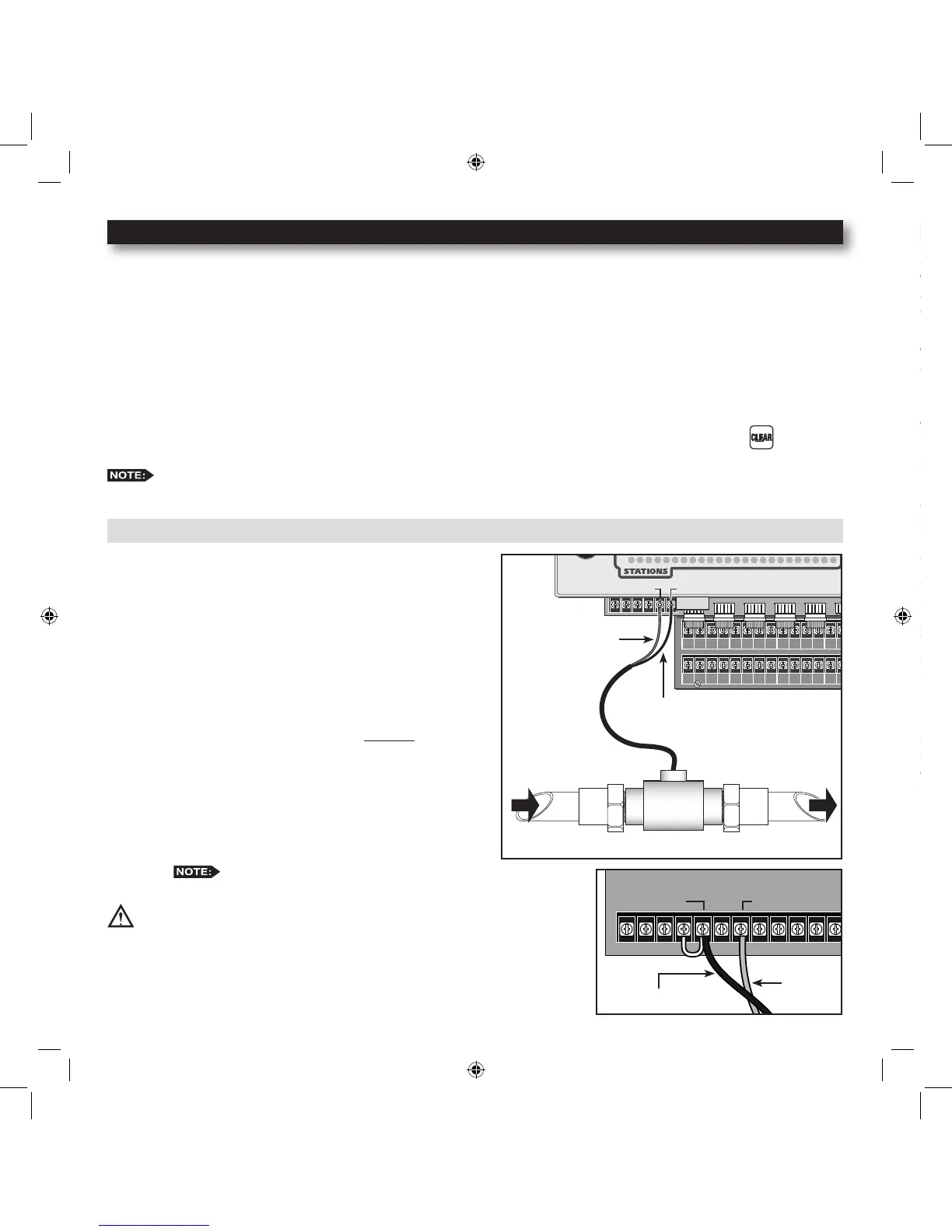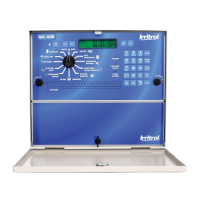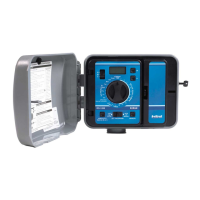34
Flow Sensor (Sold Separately)
Flow monitoring is one of the best water resource management tools available in the irrigation industry today. With
denable over and critical ow values, broken lateral or mainline piping, stuck valves and damaged sprinklers can be
quickly detected and bypassed automatically.
The ow sensing capability of the MC-E allows it to learn actual ow rates for every station. These ow rates are stored
in the memory for comparison use. Whenever a station is activated, MC-E will monitor and compare the values to detect
if overow or critical ow values have been violated. The overow percentages are user dened to ne tune the system.
The MC-E is designed to function with a normally open master valve and a ow sensor. The Data Industrial PVC tee
ow sensor model 228PV, 250BR or equivalent are the recommended sensors for use. When MC-E detects a ow value
that violates the station ow parameters, the ow alert LED indicator will illuminate. The MC-E will make an audible
beep every 30 seconds to notify you of the ow error. The controller will also display the problem station on the LCD.
The ow alert indicators will continue until the detected ow is returned within the set parameters and the button is
pressed.
Flow sensing requires that Station 1 is used for a normally-open master valve rather than a
regular station. See Optional Setup.
Flow Sensor Installation
Step 1 – Install the ow meter into the main pipe that only
supplies irrigation to the area being monitored.
Typically, it is installed just before or after the
master valve. Install the ow sensor according to
the provided instructions. Pay particular attention to
the ow direction and to the length of straight pipe
required before and after the ow sensor. Take note
of the sensor size and the pulse rating for the MC-E
ow sensor setup.
Step 2 – Route a two-wire irrigation cable from the ow
sensor to the MC-E controller. The cable can be
2000 ft. in length when using a shielded two-
conductor, 20 AWG or larger stranded copper
wire. Leave extra wire length to allow for future
servicing. Take note which wire is installed to the
red sensor wire as well as the black sensor wire.
Step 3 – At the controller terminals, connect the “Red” wire
to FLOW+ terminal. Connect the “Black” wire to
the FLOW- or SENSOR- terminal. See illustrations.
The controller will beep every 30 seconds
when an ow error is detected.
IMPORTANT! Sensor wires must be installed in the correct polarity for
proper operation. If you plan to use the controller’s ow sensing function,
set ow parameter and learn the ow value for all the stations being used.
MC-E will not execute the ow diagnostic if an active station is without
ow settings even if other active stations have ow settings congured.
Flow Sensor Setup
Flow Sensor Overview
The ow sensing system in the MC-E is designed to reduce the risk of ood damage and water waste. As previously
described, the controller requires a properly sized ow sensor in the system. Also, (connected to Station #1 which must be
converted to Flow Alarm) a normally-open master valve is required.
In the SETUP procedure all stations must be set to “MV=ON”.
The controller has an adjustable ow delay, with a default length of 1 minute, to allow the ow to “settle” after a valve
opens. After each valve’s delay period, (settable from 1 to 9 minutes) the controller will monitor the sensor reading.
Because of delay times and the length of the automatic ow diagnostic procedure, station times under 3 minutes
are not recommended when using ow sensing.
The controller can “learn” the correct ow for each irrigation zone in the system. Also, the maximum acceptable ow
limit for the main line can also be set. With the above in place, the MC-E can detect an overow condition for a particular
valve in operation (compared to its learned ow) and shut it off. If the controller can cure the ow problem by turning off
the offending station, it will identify the station with the ow error in its display, illuminate the FLOW ALARM light on
its face panel and beep once every 30 seconds to alert the user. Before moving on to the next station in the program, the
controller will check ow in the main line with all valves off. If no ow, the controller moves on. If ow is detected with
no stations on (catastrophic ow), in addition to the alerts above, the controller will energize and close the normally-open
master valve to shut off the irrigation main line.
While the controller is in
AUTO/RUN
, but idle, any detected ow with no valves on will also energize station 1
for shut down. Even if you turn the controller to Rain Off , the MC-E will continue to energize station 1 to keep the
normally-open master valve closed. To clear the ow alert and allow the master valve to open, turn the dial to
FLOW SENSING and press .
Use either STATION TEST or MANUAL to sequence through the stations or to operate a suspect station as you
visually locate the cause of the over ow or unscheduled ow condition. To allow for searching and testing, ow sensing
is not active in STATION TEST or MANUAL modes.
CAUTION:
Flow sensing is active in the controller’s automatic mode for detecting overow conditions in
the remote control valves and mainline catastrophic ow. Other water outlets in the irrigation mainline will cause
unscheduled ow and activate mainline shutdown. To operate quick coupler valves, etc. downstream of the ow sensor,
either disable ow sensing or manually turn on an unused station that has no learned ow. During operation of a station
with no learned ow, ow sensing is disabled.
When the controller is in RAIN OFF
, ow sensing is disabled.
Enable/Disable MC-E Flow Sensing
Step 1 – Place the Function dial to the FLOW SENSING position.
Step 2 – If Flow Sensing is not Enabled, the controller will prompt
“Enable Flow? Press DAYOFF”. Press the button to activate
ow sensing. The K Value/Size Code screen will be displayed when
ow sensing is successfully enabled:
Step 3 – Deactivate ow sensing by pressing the button.
When ow sensing is enabled and activated, station 1 will activate and all other scheduled watering are disabled.

